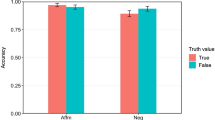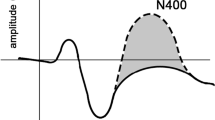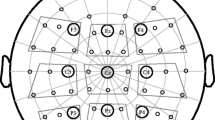Abstract
Subjects were timed while they drew inferences from syntactically affirmative and negative sentences containing the semantically positive and negative implicative predicates remember/forget and bother/neglect, under different linguistic contexts that met the presuppositions of the sentences at varying levels of generality. Different patterns of inference latencies were obtained for the two implicative predicates studied, suggesting that there are important differences among semantically negative implicative predicates that influence their representation and processing. Regardless of these differences, inference latencies for all sentences decreased when they were presented in contexts that met some of their presuppositions, indicating that context can facilitate inferential processing.
Similar content being viewed by others
References
Austin, J. L.How to do things with words. Cambridge: Harvard University Press, 1962.
Carpenter, P. A., & Just, M. A. Sentence comprehension: A psycholinguistic processing model of verification.Psychological Review, 1975,82, 45–73.
Chomsky, N. Deep structure, surface structure and semantic representation. In D. D. Steinberg & L. A. Jakobovits (Eds.),Semantics: An interdisciplinary reader in philosophy, linguistics and psychology, Cambridge: Cambridge University Press, 1971.
Clark, H. H. Semantics and comprehension. In T. A. Sebeok (Ed.).Current trends in linguistics (Vol. 12). The Hague: Mouton, 1974.
Clark, H. H., & Chase, W. B. On the process of comparing sentences against pictures.Cognitive Psychology, 1973,3, 477–517.
Fillmore, C. T. Types of lexical information. In D. D. Steinberg & L. A. Jakobovits (Eds.),Semantics: An interdisciplinary reader in philosophy, linguistics and psychology. Cambridge: Cambridge University Press, 1971.
Gough, P. B. Grammatical transformations and the speed of understanding.Journal of Verbal Learning and Verbal Behavior, 1965,5, 107–111.
Haviland, S. E., & Clark, H. H. What's new? Acquiring new information as a process in comprehension.Journal of Verbal Learning and Verbal Behavior, 1974,13, 515–521.
Hupet, M., & Le Bouedec, B. The given-new contract and the constructive aspect of memory for ideas.Journal of Verbal Learning and Verbal Behavior, 1977,16, 69–75.
Jones, S. Instructions, self-instructions and performance.Quarterly Journal of Experimental Psychology, 1968,20, 74–78.
Just, M. A., & Carpenter, P. A. Comprehension of negation with quantification.Journal of Verbal Learning and Verbal Behavior, 1971,10, 244–253.
Just, M. A., & Clark, H. H. Drawing inferences from the presuppositions and implications of affirmative and negative sentences.Journal of Verbal Learning and Verbal Behavior, 1973,12, 21–31.
Karttunen, L. Implicative verbs.Language, 1971,47, 340–358.
Klima, E. S. Negation in English. In J. H. Fodor & J. J. Katz (Eds.),The structure of language, Englewood Cliffs, New Jersey: Prentice-Hall, 1964.
Lakoff, G. On generative semantics. In D. D. Steinberg & L. A. Jakobivits (Eds.),Semantics: An interdisciplinary reader in philosophy, linguistics and psychology. Cambridge: Cambridge University Press, 1971.
Olson, D. R., & Filby, N. On the comprehension of active and passive sentences.Cognitive Psychology, 1972,3, 361–381.
Trabasso, T. Mental operations in language comprehension. In J. B. Carroll & R. O. Freedle (Eds.),language comprehension and the acquisition of knowledge. Washington, D.C.: Winston, 1972.
Wason, P. C. The contexts of plausible denial.Journal of Verbal Learning and Verbal Behavior, 1965,4, 7–11.
Wason, P. C. In real life negatives are false.Logique et Analyse, 1972, 17–38.
Wason, P. C., & Johnson-Laird, P. N.Psychology of reasoning: Structure and content. Cambridge: Harvard University Press 1972.
Author information
Authors and Affiliations
Additional information
The research reported herein is based on a portion of the author's doctoral dissertation submitted to Clark University. This paper was completed while the author was at the Center for the Study of Reading, University of Illinois, and its preparation was supported in part by the National Institute of Education under Contract No. HEWNIE-C-400-76-0116. The author would like to thank Rachel Joffe-Falmagne for her support and advice throughout this project. Special thanks are also due to Lenny Cirillo, Joseph Schmuller, and Mort Wiener for their helpful comments on earlier drafts of this manuscript.
Rights and permissions
About this article
Cite this article
Vosniadou, S. Drawing inferences from semantically positive and negative implicative predicates. J Psycholinguist Res 11, 77–93 (1982). https://doi.org/10.1007/BF01067503
Accepted:
Issue Date:
DOI: https://doi.org/10.1007/BF01067503




